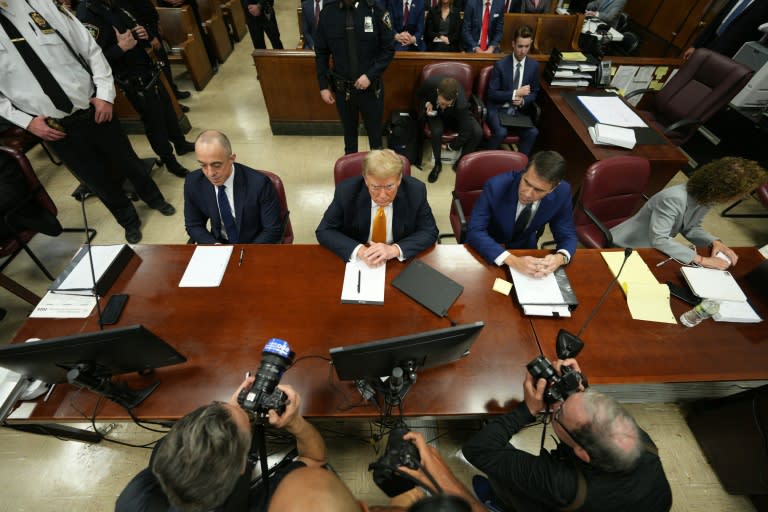Trump doesn't testify as defense rests case

- Oops!Something went wrong.Please try again later.
- Oops!Something went wrong.Please try again later.
Donald Trump's defense lawyers rested their case Tuesday -- without the former president following through on a vow to testify -- as the judge scheduled jury deliberations in the historic criminal trial for next week.
The trial has not been televised due to New York law, and experts are divided on whether the five weeks in court, more than 20 witnesses and often salacious testimony have damaged Trump politically.
But the looming verdict represents a moment of peril for Trump, less than six months before election day when he hopes to oust President Joe Biden and return to the White House.
"I think a great case was put on... It should be dismissed before you even have any verdict," the Republican said outside court Tuesday.
"It's very sad. But the good news is they've not proven the case. There is no crime."
Judge Juan Merchan told jurors that closing arguments would take place next Tuesday when each side will make their pitch to the 12 New Yorkers who will decide Trump's fate.
"I will expect you will begin your deliberations hopefully at some point on Wednesday," Merchan said.
After sending the jury home for a six-day break over a holiday weekend, the judge convened the opposing legal teams to grapple over instructions that the jurors will be given to reach a verdict.
The jury's decision must be unanimous for either a conviction or an acquittal, or the case is headed for a mistrial.
Trump's lawyers have battled hard to undermine testimony against the former president, who is accused of illegally covering up hush money paid to a porn star over an alleged encounter that could have derailed his successful 2016 White House bid against Hillary Clinton.
- Court, and campaign trail -
Lawyer Robert Costello was grilled further on Tuesday on emails he sent to prosecution star witness Michael Cohen after the FBI raided Cohen in 2018.
Costello -- one of only two defense witnesses -- had sparred with Merchan on Monday, prompting the judge to rebuke him sharply.
"We have a judge that's extremely, let's say complicated, but let's also say conflicted," Trump said Tuesday.
Cohen, Trump's former lawyer and fixer who eventually turned on his boss, gave marathon testimony, providing evidence on which the prosecution case hangs.
He recounted how he kept Trump informed about $130,000 paid to porn star Stormy Daniels to buy her silence about the alleged 2006 bedroom encounter.
Trump's lawyers set out to paint Cohen as a convicted criminal and habitual liar, recalling his time in prison for tax fraud and lying to Congress.
Trump lawyer Todd Blanche also probed Cohen's loyalty to Trump and then to the prosecution, looking to show jurors that Cohen is self-serving.
Blanche sought to goad Cohen, who has a reputation for a short temper that could have hurt him on the stand -- but the witness largely maintained his composure.
Cohen's story generally lined up with Daniels and David Pecker, the tabloid boss who said he worked with Trump and Cohen to suppress negative coverage during the Republican's 2016 White House run.
Throughout the trial, Trump has complained that his 2024 election campaign is being stymied by the weeks-long court proceedings, which he has to attend every day.
A growing coterie of leading Republicans have attended court each day, standing behind him as he delivers his regular tirades to reporters outside the courtroom.
The list has included several lawmakers in the running to be Trump's vice presidential pick, including Ohio Senator JD Vance and North Dakota Governor Doug Burgum.
Yet despite the political intrigue and courtroom drama, the charges ultimately hinge on dry financial records, and whether falsifying them was done with intent to sway the 2016 presidential vote.
burs-gw/bgs

